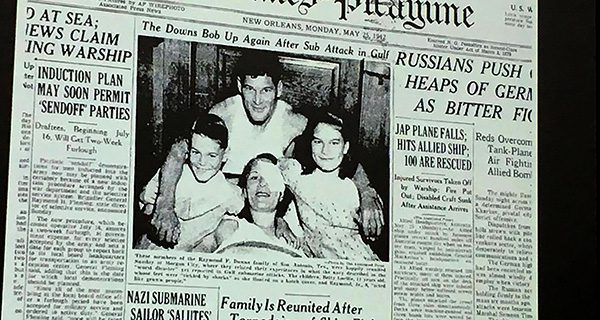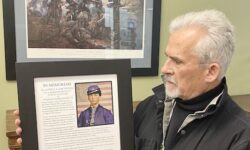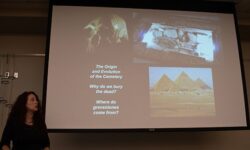[ccfic caption-text format="plaintext"]
By Katrina Margolis
Hometown Weekly Reporter
It only took Alison O’Leary and Miguel Tougias a little over two years to get their book to the publishers, which is the blink of an eye in publishing time. Considering the epic tale their book, “So Close To Home: A True Story of an American Family’s Fight For Survival During WWII,” covers, it is mind-blowing that they were able to compile their tale in such a short amount of time.
 O’Leary spoke at the Walpole Public Library, just one appearance of many she has made all over the state and beyond promoting the book. The book follows the story of the Downs family, an American family from Texas, and two German U-boat captains who’s lives unexpectedly connect. Traveling back to the United States from Costa Rica, Ray and Ina and their two children, eight-year-old Sonny and eleven-year-old Lucille, found themselves aboard the freighter Heredia. One or two day’s journey from their destination, the ship was torpedoed. Incredibly, the entire Downs family survived.
O’Leary spoke at the Walpole Public Library, just one appearance of many she has made all over the state and beyond promoting the book. The book follows the story of the Downs family, an American family from Texas, and two German U-boat captains who’s lives unexpectedly connect. Traveling back to the United States from Costa Rica, Ray and Ina and their two children, eight-year-old Sonny and eleven-year-old Lucille, found themselves aboard the freighter Heredia. One or two day’s journey from their destination, the ship was torpedoed. Incredibly, the entire Downs family survived.
Sonny Downs is still alive and living in Texas. They spoke with him extensively about his experience, and he was thrilled that his family’s story was going to be told. They also listened to tapes that his mother, Ina, recorded about the story, so the authors had multiple perspectives from which to work while writing.
O’Leary’s passion for the story shone through the details she divulged, and the intricacy with which she presented them. She is a former Boston Globe journalist, and the delight she takes in research was apparent. The book provides never before published excerpts from U-boat captain Erich Wurdemann’s diaries. These war diaries are housed in the College Park, Maryland. “When I heard that’s where they were, I jumped in my car and drove down to Maryland!” O’Leary exclaimed.
One of the most unique aspects of this story however, is that it isn’t a black-and-white portrayal of Americans and Germans during World War II. By exploring the lives and daily thoughts of the U-boat captains, as well as recalling incidents in which American planes bombed refugees being saved by the Germans, O’Leary demonstrates the blurring of good and bad that occurs during any major war.
A member of the audience raised her hand at the end of O’Leary’s presentation with more of a statement than a question: “It’s amazing because we never really learned in school about how many U-boats there were and how close they were to the East Coast.” O’Leary responded: “You’re absolutely right.”
This unique tale is one of many told by O’Leary and Tougias, and hopefully, there are many more to come from the duo.
























